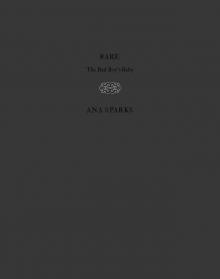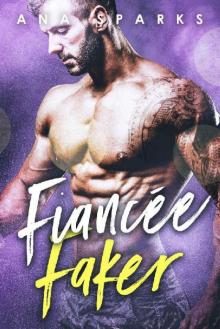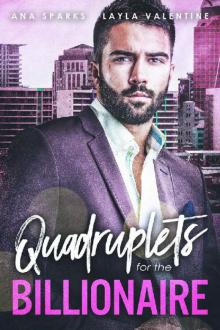- Home
- Ana Sparks
Indebted To The Sheikh (You Can't Turn Down a Sheikh Book 5) Page 5
Indebted To The Sheikh (You Can't Turn Down a Sheikh Book 5) Read online
Page 5
Just as long as they let me have the book, I thought with a shiver. It was deathly cold in the room, and I was beginning to wish I had brought a sweater. If I manage to walk out of here with the book, I’ll consider it a win.
Though, when I thought about it, I realized I wasn’t even sure how that worked. Would they give me the book upon request or would there be forms I had to fill out? Would the book be mailed to my home address at a later date? Would my lawyer even be able to speak English?
Within a few minutes he entered the room, wearing a burgundy suit and an old-fashioned powdered wig that appeared to have been snagged from an amateur theatrical production of Amadeus. Seating himself on the other side of the long table, he said, “How are you doing this morning, Ms. Renault?”
“Good, thank you.”
“Good.” Shuffling through his papers importantly, he said, “My name is Charles Moreau, and I’m representing the estate of your late father, Raymond Renault. My secretary was supposed to be joining us, but she came down with the flu yesterday and will probably be bedridden for the foreseeable future. So, let’s just dive in, shall we?”
I nodded assent, feeling a curiously prickly lump in my throat.
“Now, I wish I had better news to give you,” said Mr. Moreau. “Under normal circumstances, you would be getting the estate, whole and entire. But your father also left you with sizable debts, nearly equaling the worth of the estate. I assume you don’t want to be responsible for paying those debts yourself, so what his creditors have proposed is that they just take the entire estate.”
“All of it?” I repeated weakly. Apparently, my earlier cynicism was about to be vindicated.
“Yes, all of it. This will fulfill his obligations to his debtors and absolve you of any responsibility for paying them. You’ll return home with no debts. The downside is that you won’t be returning home with anything else, either.”
“That’s…fine,” I said with an edge of anger in my voice. I couldn’t help wondering why a man should continue to be expected to pay debts after he was already dead. “There was only one thing from the estate that I really wanted.”
“And what thing was that?” asked Mr. Moreau, more out of curiosity than conviction. The look on his face said the meeting was already over.
“Just a book that belongs to me—The Wonderful Wizard of Oz. My mother used to read to me when I was little, and I can’t imagine it having much value to his creditors.”
But the uncomfortable look on Mr. Moreau’s face suggested otherwise. “Yes, about that,” he said gravely, and I felt like someone had just shoved ice down my throat. “I think that, perhaps, no one told you the worth of that book.”
“What do you mean? What are you talking about?”
“Really, I can’t see how they didn’t inform you. What with it being a first edition and signed by the author himself, that book has a market value of over two hundred thousand dollars.”
“You’re joking.”
I barely managed to get the words out. I was so overcome with fury towards Mom and my father. Why had they never mentioned how valuable the book was? Why leave me in the dark about it?
“No, it’s true. And presumably, I don’t have to tell you what that means—”
I finished the sentence for him. “It means I’m never going to see that book again.”
Mr. Moreau nodded wearily, looking slightly exasperated.
Now that the initial shock had worn off, I could feel indignation welling up inside of me—the same zeal that had made me a terror to anyone who had gotten on the wrong end of my reporter’s pen. They couldn’t keep that book from me, surely. It was mine!
“Maybe if you just let me talk to them,” I said. “It has nothing to do with the money. It’s—”
“It’s a beloved childhood artifact,” said Mr. Moreau. “I understand.”
“Well, I need his creditors to understand,” I said in a combative tone. “I want to talk to them.”
“If you really think it would help…but I must warn you, they’re very set on keeping the book. If it would make you feel better—”
He rose from the table, mumbling to himself, and left the room. I watched him leave in surprise, wondering where he was going and thinking that perhaps he’d had enough of the conversation. With a mounting sense of frustration, I pulled out my phone and texted Aisha.
They won’t let me have the book. It was literally all I wanted out of this trip, and they won’t let me have this one thing.
Aisha didn’t respond right away, but it felt good just to have typed that. I set the phone on a corner of the table and was awaiting her response when the door opened again. Mr. Moreau reappeared, followed by the very last person I had expected to see.
I rose from the chair in surprise, wondering if my eyes were playing some sort of trick on me. “You!”
“Good morning to you, too, Ms. Renault,” Salman said.
Chapter 6
Cassie
Silence crackled in the air as we stared at each other, neither one daring to be the first to speak.
Mr. Moreau looked uneasily from Salman to me. “You two know each other?” he asked.
“We’ve met once,” said Salman curtly, his expression inscrutable.
Was he reconsidering the meeting we had planned for later that night? Was he considering how he might use my obvious affection for him to his own advantage?
“What a remarkable coincidence!” said Mr. Moreau, as if he had never heard anything so wonderful.
“You never mentioned that Mr. Renault was your father,” said Salman, looking perturbed. “When you said he had died, I assumed you meant months ago. You must have come straight from the funeral.”
“I didn’t feel like talking about it.” I hugged my arms around my chest, feeling unnerved by the caprice of the world and the cruelty of coincidence. “I wanted to forget my grief for an hour or two.”
“Oh, so you just met,” said Mr. Moreau. We both glared at him as one would at a stranger intruding on a private moment.
Just then, the door opened again, and a third man entered the room. He wore a neatly pressed blue pinstripe suit and his black Oxford shoes seemed to absorb all the light in the room. Despite his amicable-seeming exterior, my sense of being outnumbered increased.
“Ms. Renault, is it?” he asked as he reached for my hand across the table. “Asar Khan, Mr. Abidesi’s business advisor.”
“You can call me Cassie,” I said, grateful that there was a table between us and that he hadn’t tried to give me the kiss greeting popular in France.
“Ms. Renault and Mr. Abidesi were just getting reacquainted,” said Mr. Moreau.
“Oh, do you know each other?” asked Mr. Khan with a complete lack of interest. Opening a moss-green binder, he said, “Let’s get down to it, shall we? Your father owed us a considerable amount of money, and we intend to claim what belongs to us by right.”
Ignoring him, I turned to Salman, who was seated on the other side of Mr. Moreau, looking as though he was having an attack of conscience. “Business-wise, I have to agree,” he said quietly, from behind his hand.
“You agree with Mr. Khan?” I said indignantly.
Salman sank lower into his chair. “This was the arrangement we had agreed upon, yes. Legally, we have the right to take the estate. Your father’s financial malfeasance gives us”—he let out a long sigh—“legal claim over it.”
“We don’t mean to be heartless,” Mr. Khan said, “and no one likes depriving an heir of their whole estate. I imagine that when you got the notice that your father had died, it must have felt like winning the lottery.”
“I admit that wasn’t my first feeling, no,” I replied. I wondered if Mr. Khan had ever felt a human emotion in his life. “And I do consider that an extremely heartless statement you just made.”
“Well, most people of your age would be happy to learn that a loved one had left them a considerable inheritance upon their death. I’m just saying that I c
an understand your disappointment when you learned that you wouldn’t be getting any of the money that had been promised to you.”
This, coming from one of the men who was taking the money, did not make me feel better.
“And, in situations like this,” he went on, “we can’t allow emotions or relationships to intrude on business. I know it seems mercenary, but our legal obligations as creditors come before whatever relationship you may have had with your father.”
Salman coughed lightly and leaned forward. “What my advisor means to say,” he said, his face flashing embarrassment like a neon sign, “is that the world is run a certain way. And that if we allowed our natural human instinct for compassion and family to trump the cold logic of capitalism, the entire intricate infrastructure of the global economy could come crashing down.”
“The very bedrock of our civilization,” added Mr. Khan.
I gazed coolly and disbelievingly at Salman, wondering if this was the same person with whom I had eaten dinner the night before. He seemed to have been wholly transformed, like the groom in one of those old fairy tales who becomes an ogre at night.
“You really don’t have to worry,” I said, raising my hands in the air. “I’m not about to destroy civilization as we know it.”
“Then you agree to let us have the estate?” asked Salman.
“Not that your agreement makes any difference,” added Khan, unhelpfully. “We will be taking it either way, but it would be good to have your assent—for your own peace of mind, if nothing else.”
Salman glowered at his partner as if wishing that he would stop talking. His gaze then shifted to the table, clearly not wanting to meet my eyes.
I wondered what embarrassed him more: the fact that he was taking away my inheritance, or the fact that we had spent the night before making out. I supposed there was no need to inquire whether our plans were still on for tonight. I would be boarding the next plane back to Phoenix.
“Look, you can have the estate,” I said. “I never really wanted it, anyway. There is one thing my dad left me that I would like to take home, though. Just this one thing.”
“And what thing would that be?” asked Mr. Khan, elegantly curling his arm under his chin.
“My copy of The Wonderful Wizard of Oz.”
Salman and Khan exchanged glances from behind Mr. Moreau, who had been watching the proceedings with interest. I could sense weakness in Salman’s face—he might have yielded and given it up, if not for his partner.
“I don’t have any intention of selling it,” I added. “It was my favorite book growing up—that copy specifically.” A sense of desperation crept into my voice as I struggled to explain the importance of the book. “This was the book that made me fall in love with reading and want to become a writer. I doubt I would ever have become a journalist if my mother hadn’t read that book to me night after night. When we finished, I’d ask her to start over from the beginning and read it again.”
Mr. Khan held up a hand to stop me. “We understand that the book has sentimental attachments,” he said with the mechanical air of the Tin Woodman. “If it were just a book from your father’s collection, we would be willing to consider relinquishing it. Unfortunately, the value of that book makes that impossible.”
“I assume Mr. Moreau already informed you of the book’s value?” asked Salman.
“He might have mentioned it,” I said sourly. Neither of them seemed to be getting that I couldn’t have cared less what the book was worth.
“I wish we could come to some sort of agreement,” said Salman slowly, as if reading from a script. “But as one of the most valuable items in your father’s collection, the book will prove instrumental in paying off the numerous debts he owed us. It will be sold at auction, and I expect it to fetch a considerable price.”
“We’ve been waiting years for this moment,” added Mr. Khan with hawk-like savagery, “and now, we intend to collect.”
“Do you even really need the book?” I demanded. I was letting my emotions get the better of me, but I didn’t care. I wanted them to see how important it was to me. “Didn’t he have any number of houses you could sell?”
“At the time of his death, he had exactly one house,” said Mr. Khan. “It may surprise you to learn that the book is worth a fair bit more.”
“I can’t believe you’re taking this from me.” I directed my gaze at Salman, who at least had the decency to look embarrassed by his actions. “Didn’t you ever have a toy or something that you loved more than anything?”
“Look,” said Khan, “I don’t see how continuing to argue the case would be productive for either party. If you really want the book that badly, you’re welcome to buy it back from its rightful owner at full market value. We wouldn’t object to parting with the book for two hundred thousand.”
I glared at the pair of them, having to fight back tears. At this point, Mr. Khan was so far beneath my contempt it was hardly worth even continuing to talk to him. But the worst betrayal had come from Salman; I couldn’t believe he would treat me so callously and insensitively after the kisses we had shared last night.
“You don’t even care about the book,” I said angrily, surprised to find myself crying. “You probably won’t even read it. You’ll sell it the first chance you have because that’s all books are to you—a way of lining your own pockets.”
“I think this conversation has reached its logical end, don’t you?” Mr. Khan said briskly, beginning to rise from the table. “Cassidy, I won’t say it’s been a pleasure.”
I didn’t bother to correct him; I had a feeling he knew my real name and was mispronouncing it out of spite. He offered me his hand again. I glared at him until he withdrew it.
“I understand the loss of your father must have hit you very hard,” he said. “I can only offer my condolences.”
It hadn’t occurred to me that he must think I was still smarting from the ache of my father’s death. In truth, I likely would have been crying just as hard even if he hadn’t died because of what the book meant to me. It was a weird feeling, being more saddened over the loss of a book than I had been over the loss of my father—but I had spent more time with the book and had known it better.
“I do wish you had told me,” said Salman, who had been lingering awkwardly by the door. “I would have taken that into consideration last night.”
And what? I couldn’t help wondering. Would he have tried to steer the conversation toward more somber topics? Thought twice before making out with a grieving woman? But now that he knew, it didn’t seem to have affected his behavior one bit.
When I didn’t respond, he added, “Well, I guess this is goodbye, then.”
An unspoken question lingered in the air between us. “Yes, I suppose it is.”
His shoulders slumped as the implication of the statement registered. It was a little infuriating that he had been holding onto that flicker of hope. We’d both be going home alone tonight, unless he found some other naïve and unsettled woman to seduce.
“Again, I’m really sorry,” he said. He seemed to have sensed that this might be the last chance he would ever have to say what he wanted to say. “I wish things had gone differently between us. But that’s business.”
“You can go now,” I replied.
He followed Mr. Moreau and Mr. Khan out of the office, looking ashamed and apologetic. As they were leaving, I heard Khan lower his voice and speak to Salman.
“If she had wanted to win, she shouldn’t have tried using emotional appeals—or even logical or monetary, frankly. You’re a hard-nosed businessman, but you’re not above a mutually beneficial trade, huh?” he added with a chuckle.
Salman’s uneasy laughter echoed in the hallway as they slipped out the door.
I hovered in the room for a moment, wondering if perhaps I had misunderstood that last remark. Was Khan really suggesting that I could have secured the book in exchange for sex? The inappropriateness of the statement sickened me, as did Sal
man’s failure to call him out on it. Why were men always humoring their offensive colleagues instead of standing up to them?
But even as my face blushed crimson, I felt a faint ray of hope. Whether or not Khan had intended it, his last comment had shown me a potential way out.
Chapter 7
Cassie
“I’m sorry you lost the book, Cass, but that’s life,” said Patricia. “You’re not going to win every battle.”
We were seated at the island in the kitchen eating cold chicken casserole out of a plastic container. I had only just arrived back in Phoenix and, although it was the middle of the afternoon, was looking forward to climbing into bed and hibernating for a week.
“I know, but it sucks to be reminded that the world can be so cruel. I’ve never been more sure that I was on the right side of an issue—I mean, who would object to giving a woman a children’s book that belonged to her late father and was rightfully hers?”
“I get where you’re coming from,” said Patricia, “but I’m sure the worth of the book complicated things. When they looked at it, all they could see was dollar signs.”
“No, seriously,” I said angrily. “I tried to appeal to their better natures, but I might as well have been talking to the Wicked Witch of the West for all the good it did.”
I didn’t say what I was really thinking, because I didn’t want to alarm her—that if I wanted to get the book back, I might have to appeal to their basest instincts.
“Are you sure you don’t want to warm that up?” asked Patricia, eyeing the casserole warily. “I think I’m going to heat mine up.”
“No, I’m good.” After being on a plane for fourteen hours, I was feeling desperately hungry. “It feels like the whole trip was wasted, honestly. I sort of wish I had just stayed here and finished my assignment.”
“Did you not finish it?” There was a silence in which I stiffened, and then Patricia added, “You should be glad that you went to your dad’s funeral, honey. I know it’s hard to believe now, but give it a few years, and you would have regretted not going. Mine and your mom’s dad was pretty crummy, and when he died, it felt like a weight had lifted off of me. But, you know, there are still days when I miss him.”

 Dr. Ohhh
Dr. Ohhh Indebted To The Sheikh (You Can't Turn Down a Sheikh Book 5)
Indebted To The Sheikh (You Can't Turn Down a Sheikh Book 5) Dr. Ohhh - A Steamy Doctor Romance
Dr. Ohhh - A Steamy Doctor Romance BARE: The Bad Boy’s Baby
BARE: The Bad Boy’s Baby Fiancée Faker - A Bad Boy Fake Fiancée Romance
Fiancée Faker - A Bad Boy Fake Fiancée Romance V-Card For Sale – A Billionaire/Virgin Second Chance Auction Romance
V-Card For Sale – A Billionaire/Virgin Second Chance Auction Romance Quadruplets for the Billionaire (Babies for the Billionaire Book 2)
Quadruplets for the Billionaire (Babies for the Billionaire Book 2)